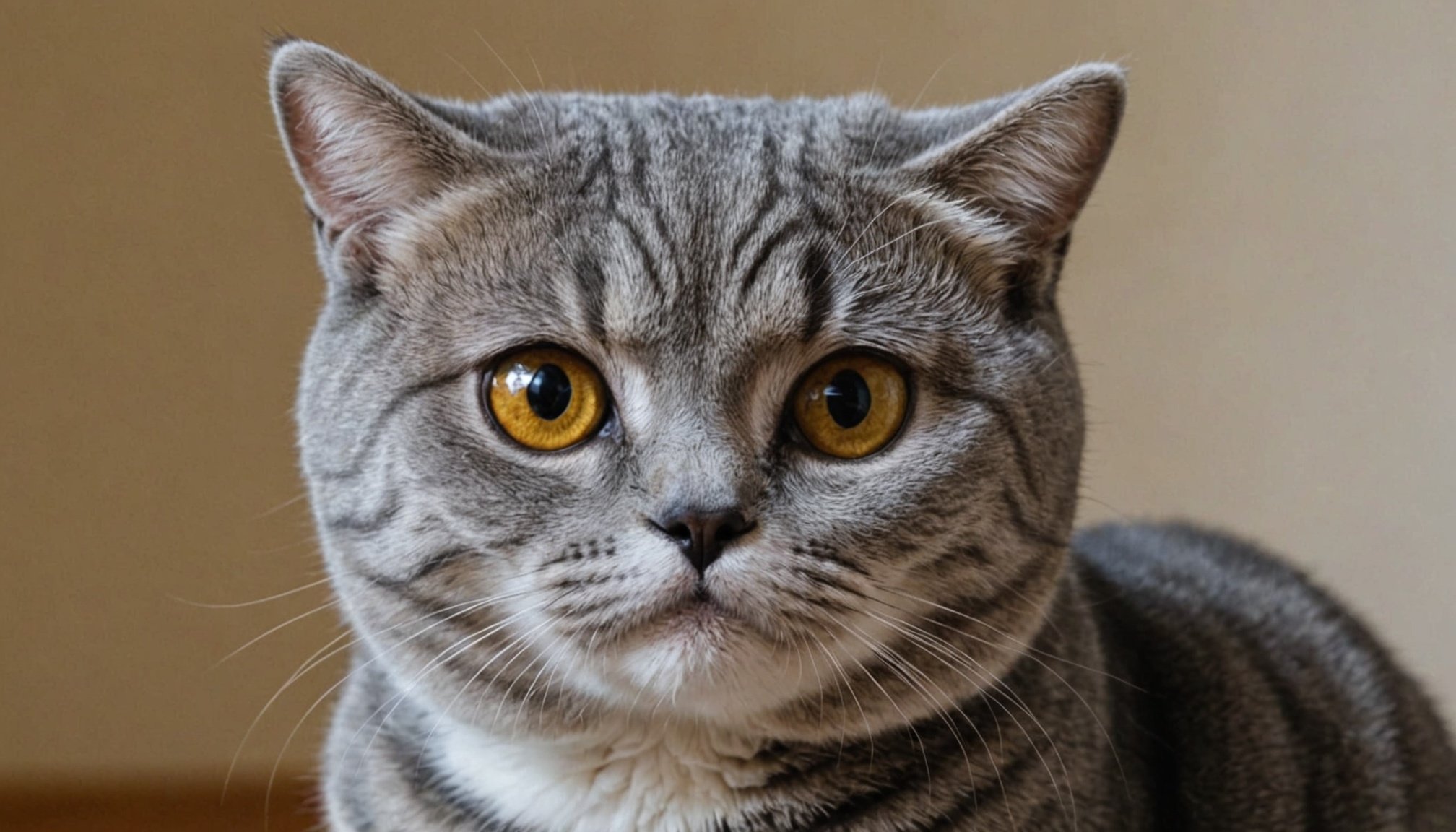Scottish Fold cats are adored for their distinctive folded ears, which give them a unique look. However, this unique feature stems from a genetic mutation that may pose specific health risks. Understanding these concerns is essential for potential cat owners and enthusiasts alike. By delving into the impact of this fascinating trait, we can better appreciate the joys and responsibilities of caring for these charming felines. Explore how the beauty of their appearance can come with hidden health challenges that deserve attention.
Genetic Basis of Scottish Fold Ear Structure
Understanding the genetic mutation that gives Scottish Folds their distinctive ears is crucial. This mutation affects the cartilage development, leading to the unique folded appearance. Specifically, the mutation occurs in the FDG4 gene, which is responsible for regulating cartilage formation. As a result, the cartilage in the ears is softer and more pliable than in other breeds.
Dans le meme genre : Mastering Sustainable Hunting Techniques: A Guide to Training Your English Pointer in British Woodlands
Genetic Mutation Impact
The genetic mutation in Scottish Folds not only influences ear shape but also impacts overall cartilage health. This can sometimes lead to joint issues, as the same gene affects cartilage throughout the body. It's important to note that this condition is unique to Scottish Folds and isn't found in breeds with standard ear structures.
Comparison with Other Breeds
- Scottish Fold: Soft, pliable ear cartilage due to FDG4 mutation.
- British Shorthair: Standard ear cartilage, no mutation.
- American Curl: Different genetic mutation, leading to backward-curling ears.
The genetic mutation in Scottish Folds highlights the diversity of feline genetics and raises awareness about potential health implications. Understanding these differences can help owners make informed decisions about breeding and care.
A lire aussi : Discovering Cornwall”s Best Dog-Friendly Beaches for Summer Adventures!
Health Concerns Associated with Scottish Fold Cats
Understanding the health issues linked to the Scottish Fold's unique ear structure is vital for potential owners. These cats are prone to several health risks due to the genetic mutation affecting their cartilage.
Common Health Issues
One of the most significant health concerns is related to the soft cartilage, which can lead to osteochondrodysplasia. This condition affects not only the ears but also the joints, potentially causing pain and mobility issues.
- Joint Pain: Often seen in the hind limbs
- Stiffness: Can lead to reduced movement
- Lameness: May occur in severe cases
Cartilage-Related Problems
The genetic disorders affecting cartilage can lead to chronic discomfort. Owners should be aware of these health risks and ensure regular veterinary check-ups to manage symptoms effectively.
Osteochondrodysplasia Implications
Osteochondrodysplasia is a severe genetic disorder that may require ongoing treatment. Understanding these health issues is crucial for providing appropriate care and improving the quality of life for Scottish Folds.
Addressing these health concerns can help minimize discomfort and ensure a healthier, happier life for these distinctive cats.
Preventive Care for Scottish Fold Cats
Ensuring the well-being of Scottish Fold cats involves comprehensive preventive health care strategies. Regular veterinary check-ups play a crucial role in maintaining their health. These visits help in early detection of potential issues, especially those related to joint health.
Regular Veterinary Check-Ups
Routine check-ups are essential for monitoring the health issues specific to Scottish Folds. Vets can identify early signs of joint discomfort or osteochondrodysplasia, allowing for timely intervention.
Dietary Considerations
A balanced diet is vital in supporting joint health. Consider foods rich in Omega-3 fatty acids and glucosamine, which can help maintain cartilage integrity. Incorporating these nutrients can be beneficial for managing cartilage-related problems.
Signs to Monitor
Owners should be vigilant for any signs of discomfort in their cats. Key symptoms to watch for include:
- Stiffness after rest
- Reluctance to jump or climb
- Noticeable joint pain during movement
These symptoms may indicate underlying health issues that require attention. By focusing on preventive health care, owners can enhance the quality of life for their Scottish Folds, ensuring they remain active and comfortable. Regular monitoring and appropriate cat care tips can make a significant difference in managing potential health concerns effectively.
Insights from Veterinary Experts
Understanding the perspectives of specialists can be invaluable for cat owners.
Expert Interviews
Veterinary experts specializing in Scottish Folds emphasize the importance of health management. Dr. Emily Carter, a noted veterinarian, states, "Regular check-ups are crucial for early detection of joint issues." Her insights underscore the need for vigilant monitoring, especially concerning osteochondrodysplasia.
Recommendations for Prospective Owners
Experts provide several recommendations for those considering adopting a Scottish Fold. These include:
- Regular Vet Visits: Essential for monitoring cartilage health.
- Dietary Supplements: Omega-3 and glucosamine can support joint integrity.
- Activity Modification: Encourage low-impact exercise to minimize stress on joints.
Case Studies
Real-world case studies highlight successful health management strategies. One notable example involves a Scottish Fold named Luna, whose owner followed a tailored care plan. Luna's condition improved significantly with a combination of dietary adjustments and regular veterinary supervision.
These expert insights and practical examples illustrate the importance of informed health management. By following these guidelines, prospective owners can ensure their Scottish Folds lead healthy, comfortable lives.
Responsible Breeding Practices
Ensuring the health and well-being of Scottish Folds through ethical breeding strategies.
Overview of Responsible Breeding
Responsible breeding practices are crucial for maintaining the health of Scottish Folds. Ethical breeders prioritize the long-term well-being of the cats over profit. This involves careful selection of parent cats to avoid passing on genetic disorders. Breeders must focus on reducing the risks associated with the FDG4 mutation by selecting pairs that minimize health issues.
Importance of Genetic Testing
Genetic testing is a cornerstone of responsible breeding programs. By identifying carriers of detrimental genes, breeders can make informed decisions that enhance the health of future generations. Regular testing helps in assessing the genetic health of breeding pairs, ensuring that only the healthiest cats are bred.
Impact of Breeding Choices
The choices made by breeders have significant implications for the long-term health outcomes of Scottish Folds. Ethical breeding can reduce the prevalence of conditions like osteochondrodysplasia. A commitment to responsible breeding ensures that Scottish Folds lead healthier lives, free from severe genetic disorders.
- Genetic Testing: Essential for assessing health risks
- Selective Breeding: Reduces genetic disorders
- Ethical Practices: Prioritize cat welfare over profit
By adhering to these practices, breeders contribute to the sustainability and health of the Scottish Fold breed.
Health Checks for Prospective Owners
Ensuring the well-being of your future pet through informed decisions.
Checklist for Health Assessments
Before adopting a Scottish Fold, it's crucial for prospective owners to conduct thorough health checks. A detailed checklist can guide you in evaluating the cat's overall health and genetic background:
- Review veterinary records for any signs of joint issues or osteochondrodysplasia.
- Confirm regular vaccinations and parasite control.
- Assess the cat's mobility and behavior for any signs of discomfort or stiffness.
Resources for Reputable Breeders
Connecting with reputable breeders is essential for ensuring a healthy adoption. Reliable breeders provide comprehensive health histories and conduct genetic testing. They should willingly answer questions about the FDG4 mutation and other potential health concerns.
Importance of Asking Questions
When adopting, don't hesitate to ask breeders about the cat’s genetic history and any previous health issues. Important questions include:
- What steps have been taken to minimize genetic disorders?
- Are there any known health problems in the lineage?
- How do they ensure the overall well-being of their cats?
By following these guidelines, prospective owners can make informed decisions, ensuring their new Scottish Fold is healthy and well-cared for. Engaging with knowledgeable breeders and conducting comprehensive health checks are vital steps in the adoption process.
Community Resources and Support
Connecting with fellow Scottish Fold enthusiasts can enhance your cat ownership experience.
Online Communities and Forums
Engaging with online communities is an excellent way for Scottish Fold owners to share experiences and advice. Platforms like dedicated forums and social media groups offer a wealth of resources for ongoing education about Scottish Fold health. These spaces provide valuable insights into managing common health concerns and offer emotional support from fellow owners.
Resources for Ongoing Education
Staying informed about the latest in Scottish Fold care is crucial. Numerous resources are available, including webinars, articles, and expert interviews, to help owners understand their pets' unique needs. These educational tools empower owners to make informed decisions about their cats' well-being.
- Webinars: Interactive sessions with veterinary experts
- Articles: In-depth guides on health and care
- Interviews: Insights from experienced breeders and veterinarians
Support Networks
Building a support network with other Scottish Fold owners can be incredibly beneficial. Sharing experiences and advice within these networks helps owners navigate challenges and celebrate successes. Whether discussing dietary needs or preventive care strategies, these connections foster a sense of community and shared purpose among cat lovers.
"The best way to care for your Scottish Fold is to learn from others and share your journey."











